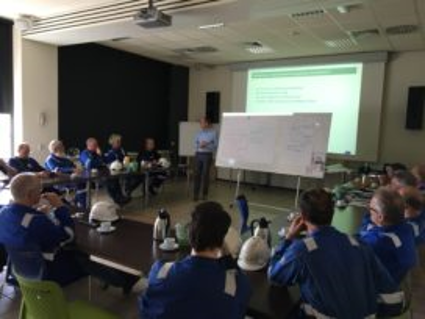
The Dutch consortium partners is TNO, the largest innovation institute of The Netherlands. TNO cooperates in INDUCE with technical training company KWA and sectoral organisation FNLI (Federation of the Dutch Food Industry) for knowledge dissemination. TNO and KWA chose to develop and run workshops with a strong behavioral component. Most energy efficiency projects focus on technical possibilities and improvements. An energy audit is an important first step in such projects, but not sufficient for a thorough understanding of energy efficiency in a company. Research shows the amount of effort companies are willing to invest in energy efficiency depends on more aspects than calculations concerning the return on investment. In fact, behaviour of employees throughout the organization and organizational culture play a vital role in energy efficiency projects.
A way to incorporate these behavioural and cultural aspects to improve successful implementation of energy efficiency projects co-creation sessions were held with members of different departments and hierarchical levels (from the workfloor to higher management). Energy efficiency is usually the responsibility of the QSHE manager. To improve the chance for successful implementation of energy efficiency projects, energy efficiency needs to be a responsibility throughout the company. This means energy efficiency needs to be translated to concrete goals which match with the function description of other professionals then the QSHE manager in question. For example, operators have influence on energy efficiency because of the manner in which machines are handles. Do operators turn on machines right before using them or several hours before because it is more convenient for them? This kind of behaviour is grounded in habits and possible to change to improve energy efficiency in companies.
During the INDUCE project, TNO and KWA developed tailor-made trainings for companies with attention to these behavioural aspects. Addressing behaviour was desirable as companies are aware how individual behaviour can influence energy efficiency, but struggle with the capacity to change behaviour. In the training, activities like an energy hunt, an interactive quiz, a factory walk and brainstorm were employed to ensure energized participation. Furthermore, the active training elements were a concrete link to the work on the ground to improve chances of implementation after the training was done. The picture shows a training with operators in one of the four Dutch companies which were trained during the INDUCE project.
